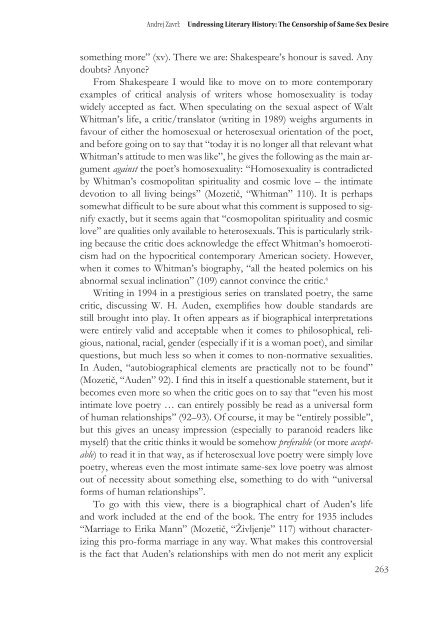Literatura in cenzura - Društvo za primerjalno književnost - ZRC SAZU
Literatura in cenzura - Društvo za primerjalno književnost - ZRC SAZU
Literatura in cenzura - Društvo za primerjalno književnost - ZRC SAZU
- No tags were found...
Create successful ePaper yourself
Turn your PDF publications into a flip-book with our unique Google optimized e-Paper software.
Andrej Zavrl:Undress<strong>in</strong>g Literary History: The Censorship of Same-Sex Desiresometh<strong>in</strong>g more” (xv). There we are: Shakespeare’s honour is saved. Anydoubts? Anyone?From Shakespeare I would like to move on to more contemporaryexamples of critical analysis of writers whose homosexuality is todaywidely accepted as fact. When speculat<strong>in</strong>g on the sexual aspect of WaltWhitman’s life, a critic/translator (writ<strong>in</strong>g <strong>in</strong> 1989) weighs arguments <strong>in</strong>favour of either the homosexual or heterosexual orientation of the poet,and before go<strong>in</strong>g on to say that “today it is no longer all that relevant whatWhitman’s attitude to men was like”, he gives the follow<strong>in</strong>g as the ma<strong>in</strong> argumentaga<strong>in</strong>st the poet’s homosexuality: “Homosexuality is contradictedby Whitman’s cosmopolitan spirituality and cosmic love – the <strong>in</strong>timatedevotion to all liv<strong>in</strong>g be<strong>in</strong>gs” (Mozetič, “Whitman” 110). It is perhapssomewhat difficult to be sure about what this comment is supposed to signifyexactly, but it seems aga<strong>in</strong> that “cosmopolitan spirituality and cosmiclove” are qualities only available to heterosexuals. This is particularly strik<strong>in</strong>gbecause the critic does acknowledge the effect Whitman’s homoeroticismhad on the hypocritical contemporary American society. However,when it comes to Whitman’s biography, “all the heated polemics on hisabnormal sexual <strong>in</strong>cl<strong>in</strong>ation” (109) cannot conv<strong>in</strong>ce the critic. 6Writ<strong>in</strong>g <strong>in</strong> 1994 <strong>in</strong> a prestigious series on translated poetry, the samecritic, discuss<strong>in</strong>g W. H. Auden, exemplifies how double standards arestill brought <strong>in</strong>to play. It often appears as if biographical <strong>in</strong>terpretationswere entirely valid and acceptable when it comes to philosophical, religious,national, racial, gender (especially if it is a woman poet), and similarquestions, but much less so when it comes to non-normative sexualities.In Auden, “autobiographical elements are practically not to be found”(Mozetič, “Auden” 92). I f<strong>in</strong>d this <strong>in</strong> itself a questionable statement, but itbecomes even more so when the critic goes on to say that “even his most<strong>in</strong>timate love poetry … can entirely possibly be read as a universal formof human relationships” (92–93). Of course, it may be “entirely possible”,but this gives an uneasy impression (especially to paranoid readers likemyself) that the critic th<strong>in</strong>ks it would be somehow preferable (or more acceptable)to read it <strong>in</strong> that way, as if heterosexual love poetry were simply lovepoetry, whereas even the most <strong>in</strong>timate same-sex love poetry was almostout of necessity about someth<strong>in</strong>g else, someth<strong>in</strong>g to do with “universalforms of human relationships”.To go with this view, there is a biographical chart of Auden’s lifeand work <strong>in</strong>cluded at the end of the book. The entry for 1935 <strong>in</strong>cludes“Marriage to Erika Mann” (Mozetič, “Življenje” 117) without characteriz<strong>in</strong>gthis pro-forma marriage <strong>in</strong> any way. What makes this controversialis the fact that Auden’s relationships with men do not merit any explicit263
















